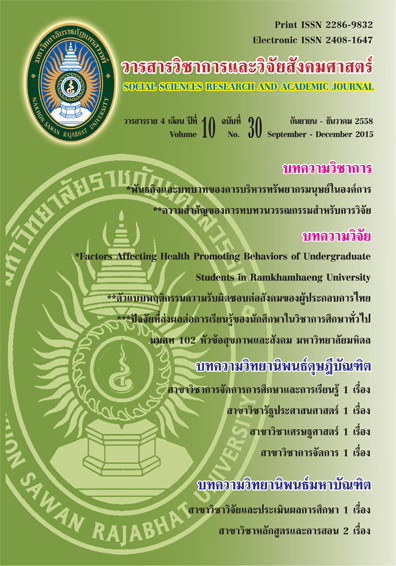การพัฒนารูปแบบการจัดการเรียนรู้วิทยาศาสตร์แบบแก้ปัญหา สำหรับนักเรียนมัธยมศึกษาตอนต้น; The Problem-based Scientific Learning Management Model Development for Secondary Students
Main Article Content
Abstract
บทคัดย่อ
การวิจัยนี้มีวัตถุประสงค์เพื่อพัฒนารูปแบบการจัดการเรียนรู้วิทยาศาสตร์แบบแก้ปัญหาสำหรับนักเรียนมัธยมศึกษาตอนต้น ดำเนินการตามขั้นตอนการวิจัยและพัฒนา 2 ขั้นตอน ดังนี้ ขั้นตอนที่ 1 การสร้างรูปแบบการจัดการเรียนรู้วิทยาศาสตร์แบบแก้ปัญหา สำหรับนักเรียนมัธยมศึกษาตอนต้น แหล่งข้อมูลคือ ผู้เชี่ยวชาญในการตรวจสอบคุณภาพรูปแบบจำนวน 5 คน ขั้นตอนที่ 2 การศึกษาผลทดลองใช้รูปแบบการจัดการเรียนรู้วิทยาศาสตร์แบบการแก้ปัญหา กลุ่มตัวอย่างคือนักเรียนชั้นมัธยมศึกษาปีที่ 3 ภาคเรียนที่ 2 ปีการศึกษา 2557 โรงเรียนวัดบางแก้ว(บางแก้วพิทยาคม) สำนักงานเขตพื้นการศึกษาประถมศึกษานครสวรรค์เขต 2 จำนวน 15 คนได้จากการเลือกสุ่มแบบกลุ่มเก็บรวบรวมข้อมูลโดยใช้แบบแผนการวิจัยเชิงทดลองแบบกลุ่มเดียววัดผลก่อน-หลังเครื่องมือในการวิจัยได้แก่ แผนการจัดการเรียนรู้วิทยาศาสตร์แบบแก้ปัญหาสำหรับนักเรียนมัธยมศึกษาตอนต้น จำนวน 12 แผน แบบวัดผลสัมฤทธิ์ทางการเรียนวิทยาศาสตร์ และแบบวัดความสามารถในการแก้ปัญหา วิเคราะห์ข้อมูลโดยใช้การทดสอบค่าที (t-test)
ผลการวิจัยพบว่า
1. รูปแบบการจัดการเรียนรู้วิทยาศาสตร์แบบแก้ปัญหาสำหรับนักเรียนมัธยมศึกษาตอนต้น มีองค์ประกอบสำคัญคือ 1. หลักการ 2. วัตถุประสงค์ 3. กระบวนการของรูปแบบ มี 6 ขั้นตอนได้แก่ ขั้นระบุปัญหา ขั้นวางแผน ขั้นแสวงหาสารสนเทศ/รวบรวมข้อมูล ขั้นสร้างองค์ความรู้ ขั้นสื่อสารความรู้ ขั้นเรียนรู้สู่สังคม และ4. การประเมินผล รูปแบบการจัดการเรียนรู้วิทยาศาสตร์แบบแก้ปัญหามีคุณภาพด้านความเหมาะสมอยู่ในระดับมาก (ค่าเฉลี่ย 4.36)
2. นักเรียนมัธยมศึกษาตอนต้นที่ได้รับการจัดการเรียนรู้วิทยาศาสตร์แบบการแก้ปัญหามีผลสัมฤทธิ์ทางการเรียนวิทยาศาสตร์และความสามารถในการแก้ปัญหาหลังเรียนสูงกว่าก่อนเรียน อย่างมีนัยสำคัญทางสถิติที่ระดับ .05
Abstract
The purpose of this research was to develop a problem-based scientific learning management model for secondary students. The procedure was undertaken in 2 steps. Step 1 constructing model to the problem-based scientific learning management model. The data concerning the model quality were checked by 5 evaluation connoisseurs. Step 2 studying the trial results of the model. The research samples used were 15 Matthayomsuksa 3 secondary students of Wat Bangkaeo Phitthayakom school, under the Office of Nakhon Sawan Primary Educational Service Area 2 in the second semester of academic year 2014 selected by cluster random sampling. The data were collected by using the experimental research plan of One Group Pretest-Posttest Design Method. The research tools consisted of the twelve scientific learning plans of the problem-based scientific learning management model, the scientific learning achievement measurement form and the scientific problem solving ability measurement form. The data was analyzed by t-test dependent.
The research results were as follows:
1. The four main components of the problem-based scientific learning management model for secondary students were 1) the principle; 2) the objectives; 3) the process with 6 steps, namely identifying the problems, planning, data gathering, knowledge building, knowledge communicating, knowledge transferring to society; and 4) evaluation. The problem-based scientific learning management model was appropriate at a high level (with the average suitability index of 4.36).
2. The secondary students being experienced by using the problem-based scientific learning management model had learning achievement higher than before learning at the .05 level of significance.


